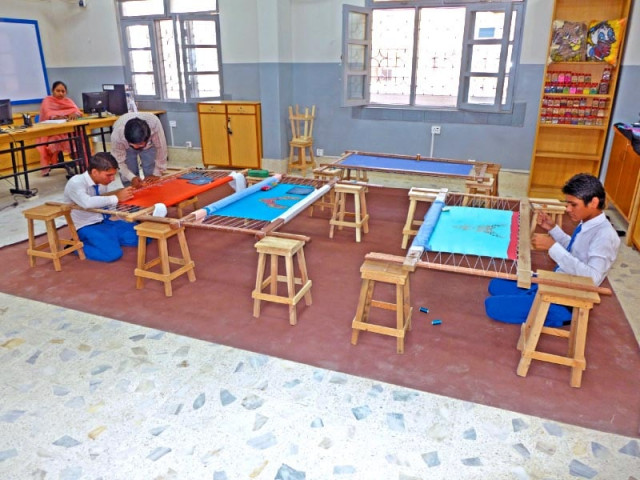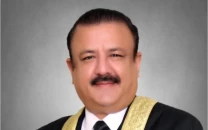It’s a sign: See if you can’t hear
An organisation’s holistic approach and development of local sign language is helping many hearing impaired.

“Deaf Reach” has a holistic approach, equipping its students with skills that can help them earn a livelihood. It also challenges gender stereo-types by teaching boys skills like hand embroidery. PHOTO: CHRIS CORK/EXPRESS
Pakistan has far too many people who are hearing-impaired and, consequently, mute. The Pakistan Association of the Deaf puts the numbers at under 350,000.
However, a leading NGO that provides education and vocational training to the hearing-impaired estimates that there are as many as nine million people with some sort of hearing loss, which comes to five percent of the population. The true figure is unlikely ever to be accurately determined, given the difficulties of compiling any accurate statistical data Pakistan’s population.
Undisputedly, the services such people need are woefully inadequate in this country. At provincial level, all governments support generic special needs education; but each of the disabilities require specific dedicated education assets.
However, many organisations are dedicated to providing education and other services specific to hearing-impaired children across the country. Deaf Reach is one such organisation.
Deaf Reach provides a uniquely holistic approach, viewing the hearing-impaired community not as a disability group but as a minority culture that happens to speak its own language, popularly known as sign-language.

Founded by Richard Geary and his wife Heidy in 1998, Deaf Reach campuses are now located in Karachi, Hyderabad, Sukkur, Nawabshah and Lahore. A new campus has been completed in Rashidabad in Sindh province. It will have 20 classrooms to provide education to 500 children, vocational training labs and hostel accommodation. The new campus will be fully commissioned and equipped by April-May 2014.
A visit to the Deaf Reach School and training centre in Gulistan-e-Jauhar was revelatory. Housed in one half of an under-used government-built vocational training centre, the school is well lit and airy, and has that essential ingredient – well trained teachers. The students are obviously happy to be there.
Not only are the students hearing-impaired but so are many of the teachers, some of whom are graduates of the early Deaf Reach programmes. A baby lay in the cradle as its hearing-impaired mother taught in a classroom close by. Young men were engrossed in delicate embroidery, learning skills and breaking gender stereotypes. Young girls were busy over sewing machines and tutors taught them skills to enable them to find jobs.
The organisation seeks partnerships with the world of business and taps into Corporate Social Responsibility. Thus, Deaf Reach graduates now staff several fast food outlets in Karachi. Some work in banks, others in retail outlets. Proof-positive that hearing-impaired does not mean unemployable.
Walking through the school, the absence of noise is striking. This lack of background chatter permits the school to hold several classes in a single large space, something that would be impossible in a conventional school. Computers and workstations have been donated by an IT corporate giant, and Deaf Reach plans to move into the creation of an income-generating stream by making and marketing its own textiles and finished goods.
Deaf Reach is creating a digital visual dictionary in Pakistan Sign Language initially holding 5,000 words. Alongside that development is a vocabulary of 1,000 basic signs in English, Urdu, Sindhi, Balochi, Punjabi and Pashto languages. A Facebook page introduces the hearing world to sign language, and the British Department for International Development (DFID) has made an innovation grant enabling the documentation and development of Pakistani sign language.
Over 5,000 children have now passed through the Deaf Reach programme. There are currently 765 children attending the schools and 46 per cent of those are female. Every school also teaches sign language to parents of hearing-impaired children and it is currently the only organisation that reaches out into distant rural communities. It works successfully with the Sindh government.
Published in The Express Tribune, December 24th, 2013.


















COMMENTS
Comments are moderated and generally will be posted if they are on-topic and not abusive.
For more information, please see our Comments FAQ